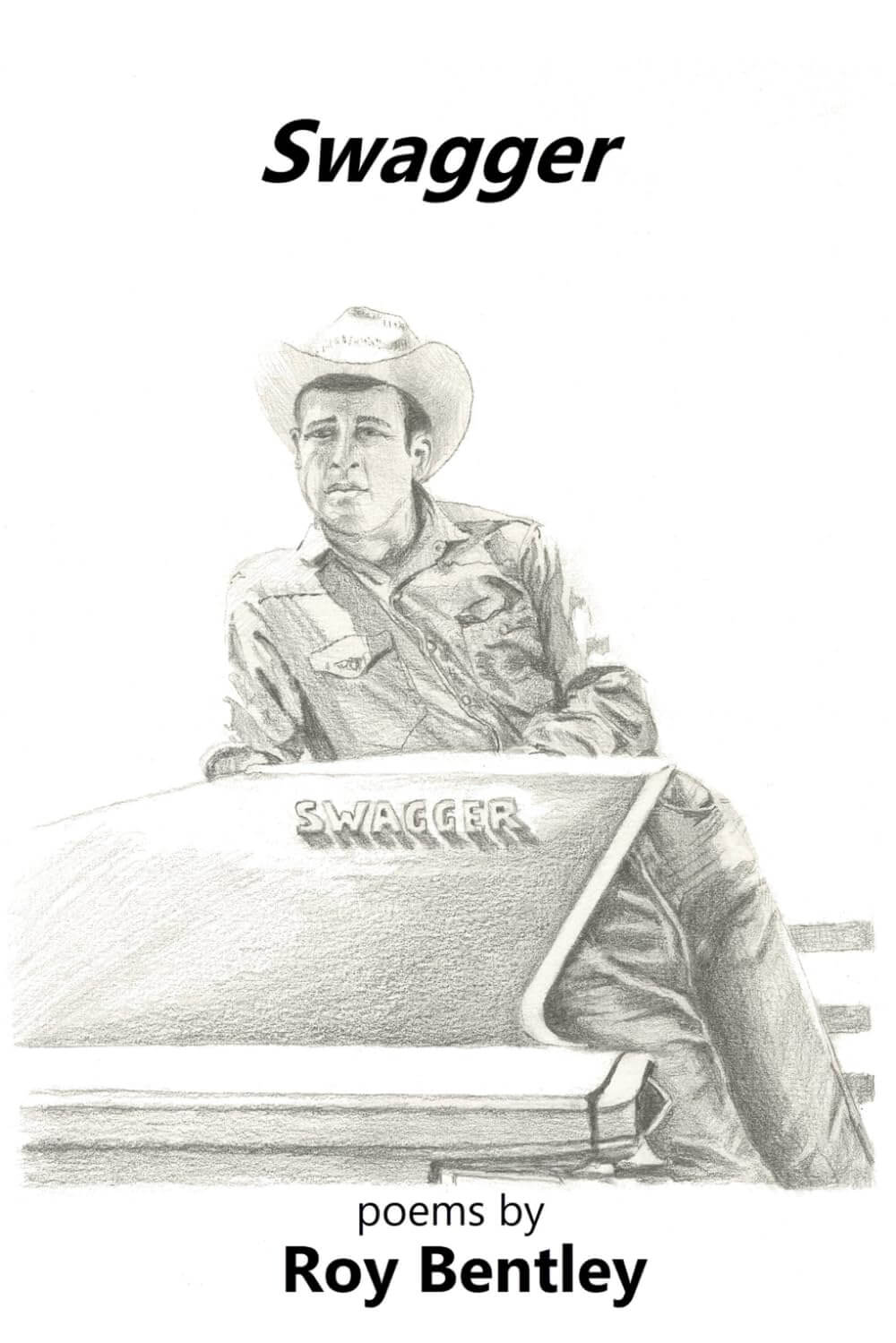
Review
The Music We Walk Around In: Swagger
By Roy Bentley
Pine Row Press
ISBN: 978-1963110043
Review by Peter Mladinic
Kentucky is in these poems, specifically eastern Kentucky, the poet’s ancestral home, and Ohio, specifically Dayton, so much so that Ohio, where Bentley lives, is a metaphor for the world. Bentley’s storytelling is reminiscent of Robert Penn Warren, from Kentucky, particularly the narrative poems Penn Warren wrote late in life. Bentley’s attitude that life is beautiful and hard and that there are people who were and are less well off than I is reminiscent of another poet from Ohio, James Wright. A Penn Warren passage is the epigram for “God & Nothing” and Wright’s anthologized “A Blessing” is alluded to in “Popsicle Toes.” Is Roy Bentley a regional poet? Yes. But first and foremost a poet, very much his own person. Three things that stand out in his work are metaphors, turns of phrase, and epistemological concerns.
Ohio is the world, and “Families on Foot Flee Shelling” extends to the Ukraine, with a scene of three girls killed instantly in war, and to Kabul, in “The Fall of Afghanistan.”
Closer to home, in “1940” in eastern Kentucky, Frank Potter, a Justice of the Peace, who sold “whisky, out of the courthouse” is arrested and stoically accepts the consequences, ultimately a year in Ashland Pen. There are consequences as well in “Poem for the Bison-taunting Man in Yellowstone.” While its tone is light, Bentley notes a mania for attention in our social media era, a mania that extends far beyond Yellowstone National Park. The man, Raymond Reinke, is caught “on surveillance video.”
Next morning, at his hotel in Mammoth Hot Springs,
the arresting officer told journalists it gave her no joy.
Check those ghost-legs in lipstick-red Tommy John’s.
Look at Reinke led around in handcuffs in his undies.
There’s Internet celebrity and then, Ray, there’s this.
“It gave her no joy.” Bentley’s turns of phrase are uniquely his. A diction that ranges from the formal to the colloquial is part of personality in the poems, and shows the poet’s command of language. People are not always in control, but the poet is. People are sometimes forced to react to their environment, such as the two in the Firebird navigating a state highway in “The Great Blizzard of ‘78.” The diction ranges from “the philological illuminations of highway signs” to “a shitload of snow and cold.” From the simple, direct comment, “Sherry and I were terrified…” the poem metaphorically concludes, In the Firebird we sat in the steady freefall of lives, our lives, frightened of what it means to fail to see what’s just ahead.” There’s a similar but different fear of what the future holds, not only for the Potter family in “1940,” but also for the family in “Drunk Driver,” where a man must answer to a charge of vehicular manslaughter. Turns of phrase in “When Paul Newman Was Alive” take in account the past and the present.
Outside, asphalt is brilliant. The way it was in the nineteen/
fifties sixties seventies eighties nineties when Paul Newman
was alive and great box office and the United States of America/
a dream that White Americans were having about themselves—
never mind armadas of ships under sail on historical horizons,
four hundred years of slavery, the new and improved racisms.
Swagger’s epistemological concerns are pervasive, more to do with the nature of being than with a creator of being. While God and religion are mentioned in numerous poems, “God passes notes by way of middlemen revivalists,” they are not in “Self-portrait as an Ohio Snowman,” a poem about a snowman, “standing upright and red-hatted,” and the nature of being. The snowman’s eventual melting attests to its (his) mortality. While the snowman, in the December afternoon is “gorgeously lit and glowing” the weather changes. “Much warmer temperatures are gathering/ as if a carrot nose must now shield us from everything.
“Swagger,” the first poem in the collection, is a quiet scene between two individuals and a lyric tour de force. It takes in geography, culture, attraction, beauty, and is replete with images that indeed capture the moment. In it, Bentley mentions mining. From Wikepedia: Canaries were…used in coal minesto detect the presence of carbon monoxide. “Swagger” is set in “a Kroger check-out line,” in 1971. “The woman” (Savannah) “wouldn’t look up at Doug. Not at first.” “But then she/ leaned over the red treadmill-belt, asking Cash or check?/ and displayed her ah-ha moment of revealing cleavage/ as if New Lexington, Ohio wasn’t a big enough bird cage.” This birdcage resonates with the plight of miners, their economic captivity, and the poverty of eastern Kentucky, from which the poets’ parents fled to Ohio.
Like the poets’ parents, Savannah “wanted out while she was still young, a grin canceling any doubt.”
Swagger is this really good poet’s best book.
About the Author
 Peter Mladinic’s most recent book of poems, House Sitting, is available from the Anxiety Press. An animal rights advocate, he lives in Hobbs, NM, United States.
Peter Mladinic’s most recent book of poems, House Sitting, is available from the Anxiety Press. An animal rights advocate, he lives in Hobbs, NM, United States.



